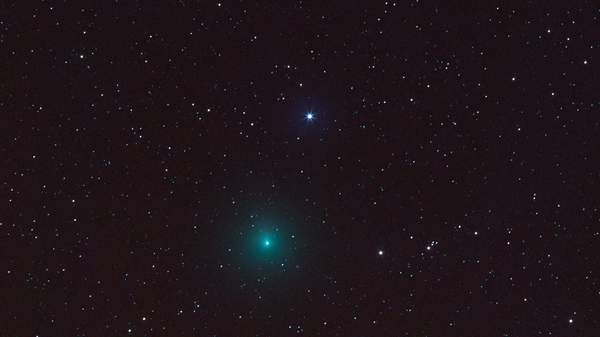Overview
In the world of astronomy, 2018 is ending as it began. After kicking into gear with an extremely rare supermoon, the year is coming to a close with another impressive sky show: the comet 46P/Wirtanen.
Given the festive time of year and the hurtling celestial object's green colour, 46P/Wirtanen has been dubbed the 'Christmas comet'. It's expected to be the brightest comet of 2018 and, while it's already a presence in the night sky, it'll be at its most vivid and glowing between December 14 and December 18. If you want to spy it at its absolute brightest — and on its closest approach to earth — NASA recommends looking up on Sunday, December 16 (in the evening down under, continuing through until the morning of Monday, December 17).
If you're wondering how close it'll be, 46P/Wirtanen will be 11.7 million kilometres away, which equates to 30 times the distance to the moon. As for how vibrant it'll be, the comet should range between 3 and 7.5 on the naked-eye magnitude. At the upper end, that's dimmer than the brightest stars but still visible without binoculars or a telescope. At the lower end, you'll need one of the aforementioned pieces of equipment to help you see it.
However you're choosing to take a gander, you'll be peering at a comet that was first discovered in 1948 by American astronomer Carl A. Wirtanen. It measures approximately 1.2 kilometres in diameter, and completes its orbit every 5.4 years, but it's not expected to venture this close to earth again for another 20 years.
For the best view, the ABC advises looking north-east, and using either binoculars or a DSLR camera. You might also want help from an online chart to get you looking in the right spot, with The Comet Wirtanen Observing Campaign offering a guide.
Heading as far away from city lights is also recommended, as it always is when the sky is putting on a spectacle. If you're thinking of camping out, you might want to consider making a weekend of it. 46P/Wirtanen's brightest spell comes two days after the impressive Geminids meteor shower, which is expected to be visible from late evening on Friday, December 14 through to the early morning on Saturday, December 15.
The Virtual Telescope Project will also be streaming live images of 46P/Wirtanen between December 12 and 17.
46P/Wirtanen will be at its brightest during the night of on Sunday, December 16.
Image: Stephen Rahn.
